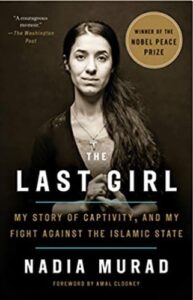 “You can’t handle the truth,” the famous line uttered by Jack Nicholson in A Few Good Men, could well be the motto of many educrats. Sheltering students from the truth when it offends the politically correct sentiments of favored minorities is all too common. And this phenomenon is not limited to the United States. Consider this from the UK Daily Mail:
“You can’t handle the truth,” the famous line uttered by Jack Nicholson in A Few Good Men, could well be the motto of many educrats. Sheltering students from the truth when it offends the politically correct sentiments of favored minorities is all too common. And this phenomenon is not limited to the United States. Consider this from the UK Daily Mail:
A Canadian school has cancelled an event with ISIS survivor Nadia Murad, saying her visit would be offensive to Muslims and foster ‘Islamophobia’.
Murad was scheduled to sit down with students from the Toronto District School Board (TDSB) – the largest school Board in Canada with nearly 600 schools – to discuss her book The Last Girl: My Story Of Captivity in February 2022.
Murad’s graphic exposé detailed how she escaped the Islamic State, where she was ripped from her home and sold into sexual slavery aged just 14 years old, according to The Telegraph.
She uses the book to talk about how she was raped and tortured before finding her way to a refugee camp in Durhok, in northern Iraq, and then to Germany where she now lives. But before the event could happen the superintendent of the Board Helen Fisher said that her students would not participate.
![]() She has since issued an apology but refused to allow her students to attend.
She has since issued an apology but refused to allow her students to attend.
Fisher expressed that she believed the book would ‘promote Islamophobia’ and cited how offensive the book was to her Muslim students as her reason for cancelling the event.
Isn’t it more offensive to censor the reality of radical orthodox Islam? ISIS, a fundamentalist group that enforces the literal application of Sharia, is a significant actor, and may soon be (if not already) operating in Afghanistan, where Canadian troops were, until recently, stationed. Is this part of reality to censored? A presentation by a Nobel Peace Prize winner, no less.
Radical orthodox Islam is a big factor in world politics in this era. Hiding students from its reality makes them ignorant of an important part of the world in which they are being prepared to live.
![]() If censoring historical reality that may cause a group of students to feel shame or to feel hostility from others is to be the practice, then how about censoring discussion of slavery in the United States? Or, to take a Canadian topic, the treatment of the indigenous population – who are called “First Canadians” — by Europeans?
If censoring historical reality that may cause a group of students to feel shame or to feel hostility from others is to be the practice, then how about censoring discussion of slavery in the United States? Or, to take a Canadian topic, the treatment of the indigenous population – who are called “First Canadians” — by Europeans?
Or are the feelings of Muslim students more important than the feelings of European heritage Canadians?
I am afraid that the answer to that question is all too obvious.



Leave a Reply
You must be logged in to post a comment.